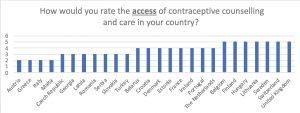A comprehensive questionnaire-based study commissioned by the European Board and College of Obstetrics and Gynaecology (EBCOG) and the European Society of Contraception (ESC) explored significant variations in the provision of sexual and reproductive health (SRH) services across 26 European countries. This research sheds light on disparities in access, quality of care, and the availability of essential services such as contraception, abortion care, and pre-pregnancy counselling.
One of the key findings from this study is the inconsistency in national guidelines and policies for contraceptive counselling and abortion care across the surveyed countries. While some countries have well-established national frameworks, others rely on international guidelines like those provided by the World Health Organization (WHO) or the UK Faculty of Sexual and Reproductive Healthcare (FSRH). Nine of the countries surveyed lacked any national guidelines for contraception, which leads to inconsistent care and limits access to reliable family planning methods, particularly for underserved populations. This gap in structured care also extends to the quality of care, with countries rating their own services on a scale from “very low” to “very high.” Six countries, including some Eastern European nations, rated the quality of care as low or very low, while five countries, primarily in Western Europe, rated their care as very high.
The disparity is not just in the availability of care but also in the education and training of healthcare professionals. The study revealed that many European countries do not provide structured education programs for healthcare professionals—particularly nurses and midwives—who play a vital role in delivering contraceptive and abortion services. In 16 out of the 26 countries surveyed, there were no formalized education or training programs for nurses, midwives, or even medical doctors working in SRH services. This absence of professional training undermines the quality of care and exacerbates disparities in service provision. Countries with no structured training programs must rely on less formal, ad-hoc training methods, which can lead to significant variability in the quality of care.
The research also highlighted issues surrounding access to emergency contraception (EC). In some countries, emergency contraceptives like Levonorgestrel (LNG) and Ulipristal Acetate (UA) are available over-the-counter (OTC), while others require a prescription. This variability in access creates significant barriers for women in need of urgent contraception, especially in countries where EC is either restricted or difficult to access. In addition, very few countries offer online counselling services for contraception and abortion care, despite the growing need for digital healthcare solutions. Online services could significantly reduce barriers to access, particularly for young people and those living in rural areas.
Abortion care also varies widely across Europe. Some countries allow unrestricted access to abortion services in the first trimester, while others, such as Malta, heavily restrict abortion even in cases of unplanned pregnancies. The study found that even in countries where abortion is legal, second-trimester services are often limited, requiring women to travel long distances to access care. This creates additional emotional and financial burdens, especially for women from lower socio-economic backgrounds.
The study concludes that addressing these disparities requires a multi-faceted approach, including the implementation of unified guidelines, improved professional training, and increased access to both contraception and abortion services. Collaboration between European healthcare organizations is essential to bridge these gaps, and the development of European-wide educational programs could be a significant first step. By ensuring that healthcare professionals are well-trained and that services are more accessible, Europe can work towards ensuring that sexual and reproductive healthcare is both equitable and high-quality for all women.
Journal Article: Khattak, Hajra, et al. “Variations in Sexual and Reproductive Health Services for the Provision of Comprehensive Contraceptive and Abortion Services across Europe: A Questionnaire-Based Study Commissioned by the European Board and College of Obstetrics & Gynaecology (EBCOG) and European Society of Contraception (ESC).” European Journal of Obstetrics & Gynecology and Reproductive Biology, vol. 299, 22 May 2024, pp. 350–358, https://doi.org/10.1016/j.ejogrb.2024.05.026. Accessed 6 Nov. 2024.
Summary by Faith Oluwamakinde











